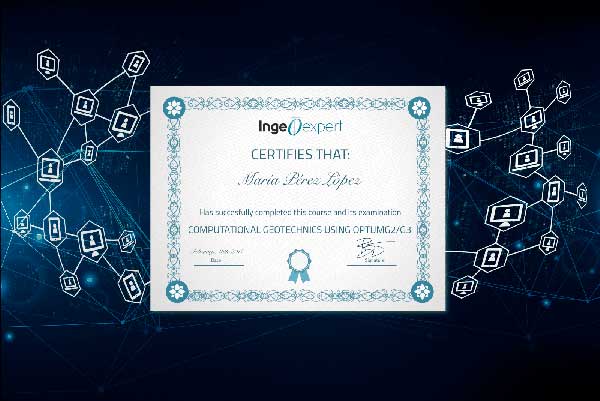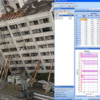Geotechnical instrumentation for construction sector
Online course |
|
50 hours / 6 weeks |
|
|
Dates: 8th of July to 19th of August |
| Standard | Unemployed Or Student |
| $292 | $216 |
Introduction
Some might still consider geotechnical instrumentation and monitoring works in the construction sector to be just a contractual obligation that unnecessarily delays progress and increases expenditures for a project. However, there have been many mega construction failures resulting in fatalities and millions of dollars in losses due to a lack of monitoring and design verification. A good instrumentation and monitoring system, with proper installation, monitoring, and data analysis, could avoid catastrophic construction accidents. These instrumentations play a key role in design verification and safety monitoring during the construction stage. In order to understand the importance of instrumentation, it is important for engineers to be equipped with knowledge of instrumentation, including the selection of the right instruments, their installation methods, and QA/QC in installation and monitoring.
Objectives
The objectives of this course are to introduce the correct concept and approach to instrumentation, from design concept to the interpretation of data, and to share good practices.
Unit 1. Introduction to Geotechnical Instrumentation (1st week)
- – Purpose
- – Objectives
- – Introduction to types of measurements and their instruments
Unit 2. Regulatory Requirement and Case Studies (1st week)
- – Authority regulation requirements
- – Why they are necessary
- – Case studies
Unit 3. Understanding of Basic Soil Mechanics and Instruments (2nd week)
- – Classification of Instruments
- – How they relate to soil mechanics
Unit 4. Design and selection of instrumentation (2nd week, 3rd week)
- – Information to consider when designing instruments
- – Understanding the differences between resolution, accuracy, repeatability and errors
- – Error vs human mistake
- – Limitations of instruments
- – Good practices for design and selection of instruments
Unit 5. Instrumentation monitoring (manual and automation) (4th week)
- – Comparison of manual, automated and real time monitoring
- – The more always better?
Unit 6. How to interpret data? (4th and 5th week)
- – How to interpret and verify data
- – Common questions about instrumentation
- – Does a flat trend always indicate good results?
Unit 7. Roles and responsibilities (6th week)
- – Relationship between Stakeholders
- – Signs of construction failures and remedial measures
- – Action plan and remedial measures
- – Collective efforts
Unit 8. Innovation and future in instrumentation monitoring (6th week)
- – Comparison of conventional and alternative methods
- – Consideration of cost, safety and sustainability
Liau Keng Chung
The course is delivered online through our easy-to-use Virtual Campus platform. For this course, a variety of content is provided including:
– eLearning materials
– Videos
– Interactive multimedia content
– Live webinar classes
– Texts and technical articles
– Case studies
– Assignments and evaluation exercises
Students can download the materials and work through the course at their own pace.
We regularly update this course to ensure the latest news and state-of-the-art developments are covered, and your knowledge of the subject is current.
Live webinars form part of our course delivery. These allow students and tutors to go through the course materials, exchange ideas and knowledge, and solve problems together in a virtual classroom setting. Students can also make use of the platform’s forum, a meeting point to interact with tutors and other students.
The tutoring system is managed by email. Students can email the tutor with any questions about the course and the tutor will be happy to help.
- – College and university students in Civil Engineering, Geotechnical Engineering, or related disciplines who want to learn about new knowledge outside their current studies,
- – Practitioners (technicians, supervisors, and engineers) who need to learn or refresh their knowledge on instrumentation and monitoring.
By completing the course, learners will fully understand and appreciate the importance of instrumentation and monitoring in construction, and learn how to analyze and interpret monitoring data.
Once a student finishes the course and successfully completes the assignments and evaluation tests, they are sent an accreditation certificate. The certificate is issued by Ingeoexpert to verify that the student has passed the course. It is a digital certificate that is unique and tamper-proof – it is protected by Blockchain technology. This means it is possible for anyone to check that it is an authentic, original document.
This course is suitable for anyone studying or working in the Civil Engineering or related discipline sector at any level.
Understanding the behavior of instrumentation during construction allows for the early identification of unplanned, excessive movement or potential impending failure, giving the design team the opportunity for early intervention and the ability to carry out mitigation work.
Introduction
Some might still consider geotechnical instrumentation and monitoring works in the construction sector to be just a contractual obligation that unnecessarily delays progress and increases expenditures for a project. However, there have been many mega construction failures resulting in fatalities and millions of dollars in losses due to a lack of monitoring and design verification. A good instrumentation and monitoring system, with proper installation, monitoring, and data analysis, could avoid catastrophic construction accidents. These instrumentations play a key role in design verification and safety monitoring during the construction stage. In order to understand the importance of instrumentation, it is important for engineers to be equipped with knowledge of instrumentation, including the selection of the right instruments, their installation methods, and QA/QC in installation and monitoring.
Objectives
The objectives of this course are to introduce the correct concept and approach to instrumentation, from design concept to the interpretation of data, and to share good practices.
Unit 1. Introduction to Geotechnical Instrumentation (1st week)
- – Purpose
- – Objectives
- – Introduction to types of measurements and their instruments
Unit 2. Regulatory Requirement and Case Studies (1st week)
- – Authority regulation requirements
- – Why they are necessary
- – Case studies
Unit 3. Understanding of Basic Soil Mechanics and Instruments (2nd week)
- – Classification of Instruments
- – How they relate to soil mechanics
Unit 4. Design and selection of instrumentation (2nd week, 3rd week)
- – Information to consider when designing instruments
- – Understanding the differences between resolution, accuracy, repeatability and errors
- – Error vs human mistake
- – Limitations of instruments
- – Good practices for design and selection of instruments
Unit 5. Instrumentation monitoring (manual and automation) (4th week)
- – Comparison of manual, automated and real time monitoring
- – The more always better?
Unit 6. How to interpret data? (4th and 5th week)
- – How to interpret and verify data
- – Common questions about instrumentation
- – Does a flat trend always indicate good results?
Unit 7. Roles and responsibilities (6th week)
- – Relationship between Stakeholders
- – Signs of construction failures and remedial measures
- – Action plan and remedial measures
- – Collective efforts
Unit 8. Innovation and future in instrumentation monitoring (6th week)
- – Comparison of conventional and alternative methods
- – Consideration of cost, safety and sustainability
Liau Keng Chung
The course is delivered online through our easy-to-use Virtual Campus platform. For this course, a variety of content is provided including:
– eLearning materials
– Videos
– Interactive multimedia content
– Live webinar classes
– Texts and technical articles
– Case studies
– Assignments and evaluation exercises
Students can download the materials and work through the course at their own pace.
We regularly update this course to ensure the latest news and state-of-the-art developments are covered, and your knowledge of the subject is current.
Live webinars form part of our course delivery. These allow students and tutors to go through the course materials, exchange ideas and knowledge, and solve problems together in a virtual classroom setting. Students can also make use of the platform’s forum, a meeting point to interact with tutors and other students.
The tutoring system is managed by email. Students can email the tutor with any questions about the course and the tutor will be happy to help.
- – College and university students in Civil Engineering, Geotechnical Engineering, or related disciplines who want to learn about new knowledge outside their current studies,
- – Practitioners (technicians, supervisors, and engineers) who need to learn or refresh their knowledge on instrumentation and monitoring.
By completing the course, learners will fully understand and appreciate the importance of instrumentation and monitoring in construction, and learn how to analyze and interpret monitoring data.
Once a student finishes the course and successfully completes the assignments and evaluation tests, they are sent an accreditation certificate. The certificate is issued by Ingeoexpert to verify that the student has passed the course. It is a digital certificate that is unique and tamper-proof – it is protected by Blockchain technology. This means it is possible for anyone to check that it is an authentic, original document.
This course is suitable for anyone studying or working in the Civil Engineering or related discipline sector at any level.
Understanding the behavior of instrumentation during construction allows for the early identification of unplanned, excessive movement or potential impending failure, giving the design team the opportunity for early intervention and the ability to carry out mitigation work.
More info
Finish this course and get a certificate based on Blockchain
Geotechnical instrumentation for construction sector

Blockchain technology makes the certificate incorruptible, enabling companies to verifiy its autenticity.
Geotechnical instrumentation for construction sector
| $292 | $216 | |
| Get more information |





Reviews
There are no reviews yet.